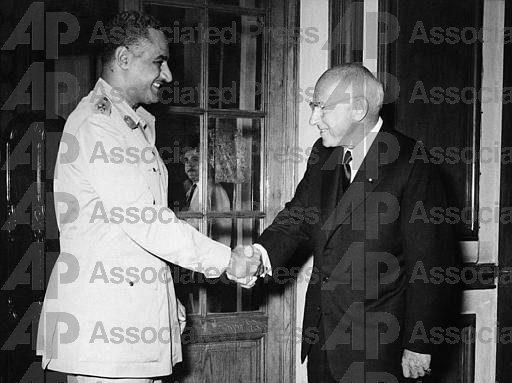
Al-Azhar has called for the banning of the Noah film due to the religious violation of showing a Prophet. So far the screening will go ahead “despite religious concerns.”
Yet there was a time when such films were banned for different reasons. Film titan Cecil DeMille opened up negotiations with King Farouk for permission to film in Egypt the epic story of Moses in The Ten Commandments. The King agreed but was then deposed in July 1952. DeMille had to engage in furious renegotiation’s with the new rulers as the filming was set to start in the Autumn of 1954.
A few months before that deadline, Demille and his colleagues were taken in a state car to a military encampment where Colonel Gamal Abdel Nasser himself “strode in, filling the tent with a blinding charisma that was all dark burning eyes, flashing white teeth, and impeccable English.”
Demille was telling Nasser and Hakim Amer (Minister for War) why the film will be good, and they started to laugh uncontrollably. Nasser got hold of himself, and then burst out laughing again. To the incredulous look of Demille.
“You tell them what you are laughing about!” Nasser ordered Amer.
After Amer caught his breath, he began: “Mr DeMille…We grew up on your film The Crusades, and we saw how you treated us and our religion. Our country is your country.”
The slightly longer version of what Amer said: “the Crusades was immensely popular here in Egypt. It ran for three years in the same theater in Cairo, and Col. Nasser and I saw it no less than twenty times. It was our favourite picture when we were attending military school. And Col. Nasser was called ‘Henry Wilcoxon’ by the other students because he would grow up to be a great military leader someday, just like Coeur-de-Lion.”
With that the deal was sealed, and Nasser’s army even acted as Pharaoh’s soldiers in the film.
However, by the time the Ten Commandments was released in 1956, so much had changed on the political scene and it was the year of the Suez War and Arab nationalism was in overdrive mode.
The film was banned in Egypt because Nasser felt it favored “the Jews over the Egyptians”
Clearly, Nasser should have realised the obvious that Egyptian national interests don’t do quite well in the Bible and the Quran.
Source:
Empire of Dreams: The Epic Life of Cecil B. DeMille
By Scott Eyman
Written in Stone: Making Cecil B. DeMille’s Epic The Ten Commandments
By Katherine Orrison






